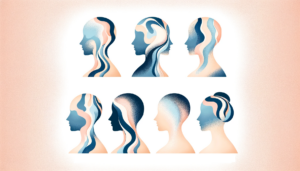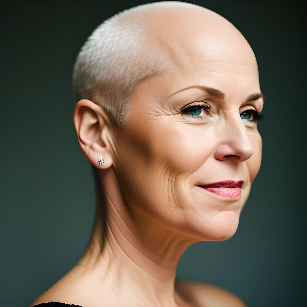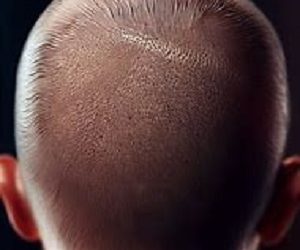Alopecia: Understanding the Basics
 Alopecia, a term many might have heard but hope never to experience, represents not just a physical condition but an emotional journey for many women. It’s more than hair loss; it’s a mirror to our health, reflecting issues that are often invisible to the eye.
Alopecia, a term many might have heard but hope never to experience, represents not just a physical condition but an emotional journey for many women. It’s more than hair loss; it’s a mirror to our health, reflecting issues that are often invisible to the eye.
Alopecia, in its essence, is a condition marked by hair loss, ranging from mild to severe cases where one might lose hair from the scalp or all over the body. It’s types vary, including Alopecia Areata, Totalis, and Universalis, each presenting its own set of challenges and emotional tolls on those affected.
This condition is not just a matter of aesthetics but is deeply intertwined with our identity and how we perceive ourselves in the mirror and in society. The journey of someone going through Alopecia is not solely about the physical loss of hair but also navigating the emotional and psychological impacts it brings.
Understanding Alopecia: Types and Definitions
Alopecia, a complex condition with varying manifestations, affects individuals differently. This section delves into the main types of Alopecia, each characterized by distinct patterns of hair loss, providing insight into this diverse condition.
- Alopecia Areata (Patchy)
This is the most common form, presenting as one or more coin-sized patches of hair loss on the scalp or body. While it may progress, many experience only these isolated patches. - Alopecia Totalis
This marks a more severe stage, resulting in total hair loss across the scalp. This form challenges not just one’s appearance but also their inner resilience, as it significantly alters one’s look. - Alopecia Universalis
When hair loss extends beyond the scalp, leading to hair loss across the entire body. It represents the condition’s most extensive form, affecting eyebrows, eyelashes, and body hair, pushing individuals to find new ways to connect with their identity beyond their physical appearance. - Diffuse Alopecia Areata
Sudden, widespread thinning of hair across the scalp, making it difficult to diagnose due to its resemblance to other hair loss types. - Ophiasis Alopecia
This is a unique pattern of hair loss, wrapping around the sides and back of the head in a band-like formation.
Exploring the Root Causes of Alopecia
Autoimmune Response
At the heart of Alopecia Areata is an autoimmune response, where the body’s immune system mistakenly targets your hair follicles. This response leads to the characteristic patchy hair loss. The exact triggers of this immune response are still under investigation, but it’s clear that the body’s defense mechanisms play a pivotal role in the onset of this type of Alopecia.
Genetic Factors
Genetics also contribute significantly to the risk of developing Alopecia. Studies suggest that individuals with a family history of autoimmune diseases, including Alopecia Areata, are at a higher risk.
This genetic predisposition indicates that Alopecia is not just a random occurrence but can be deeply rooted in one’s genetic makeup.
Environmental Triggers
While the primary focus is on autoimmune and genetic factors, environmental triggers cannot be ignored. Stress, diet, and toxins have all been proposed as potential contributors that might trigger or exacerbate the condition. Understanding these factors is essential for managing Alopecia, as it highlights the importance of a holistic approach to treatment and prevention.
The Emotional Impact of Alopecia
- Identity and Self-Perception
Hair is often intertwined with identity and personal expression. The loss of hair can lead to a crisis of self-image, where individuals must reconcile their appearance with their sense of self. This adjustment is deeply personal and can vary greatly in its emotional impact. - Social and Psychological Effects
Beyond the mirror, the effects of Alopecia ripple out to social interactions and relationships. The visibility of the condition can lead to unwanted attention or questions, adding layers of stress and anxiety. It’s a test of resilience, as individuals navigate both their internal struggles and external perceptions. - Support and Understanding
The path to emotional healing often begins with finding understanding and support. Whether through professional counseling, support groups, or connecting with others on a similar journey, sharing experiences can provide a sense of community and belonging. It’s through these connections that many find the strength to embrace their condition and the changes it brings. - Empowerment Through Education
Knowledge is a powerful tool in managing the emotional effects of Alopecia. Understanding the condition, its causes, and treatment options can empower individuals, turning feelings of helplessness into actions towards management and acceptance.
Latest Treatment Options for Alopecia
Medical Treatments
- Minoxidil (Rogaine)
This over-the-counter topical treatment is used to stimulate hair growth in affected areas. It’s one of the most accessible treatments, often recommended for various types of Alopecia. - Corticosteroids
These anti-inflammatory drugs can be administered through injections, topical ointments, or oral tablets to suppress the immune system’s attack on hair follicles. - Immunotherapy
Drugs like diphenylcyclopropenone (DPCP) are applied to the scalp to modify the immune response, encouraging hair regrowth in some individuals. - JAK Inhibitors
A newer class of medications that block Janus kinase pathways, which are involved in the body’s immune response, showing promise in treating Alopecia Areata.
Lifestyle and Home Remedies
- Dietary Adjustments
Incorporating a nutrient-rich diet with vitamins and minerals essential for hair growth, such as iron, zinc, and vitamin D, can support overall hair health. - Stress Management
Techniques such as yoga, meditation, and regular exercise can help manage stress levels, potentially reducing the severity of Alopecia flare-ups.
Advanced Therapies
- Platelet-Rich Plasma (PRP) Therapy
This treatment involves injecting your own platelets into the scalp to stimulate hair growth by promoting healing and increasing blood supply to the hair follicles. - Low-Level Laser Therapy (LLLT)
LLLT uses laser light to stimulate cell growth and rejuvenate hair follicles, showing effectiveness in some Alopecia cases.
Surgical Options
 For those with permanent hair loss, surgical options like hair transplant surgery may be considered. This involves moving small patches of skin, each with several hairs, to bald parts of your scalp.
For those with permanent hair loss, surgical options like hair transplant surgery may be considered. This involves moving small patches of skin, each with several hairs, to bald parts of your scalp.
It’s important to consult with a healthcare professional to determine the most appropriate treatment based on the type of Alopecia, its severity, and individual health considerations. Each treatment option has its own set of benefits and potential side effects, making professional guidance invaluable.
Treatment for Alopecia is advancing, with ongoing research into new therapies and solutions. By staying informed and consulting with specialists, individuals can find the most effective strategies to manage their condition and improve their quality of life.
Conclusion: Navigating Alopecia with Hope and Resilience
Alopecia is more than a condition of hair loss; it’s a journey that tests the resilience, courage, and spirit of those it touches. Through understanding its types, causes, and the emotional toll it takes, individuals can begin to navigate their path with a sense of empowerment and hope. The treatments available today offer avenues for management and improvement, signaling that while the journey may be challenging, it is not one that has to be walked alone.
Frequently Asked Questions?
Is Alopecia Areata permanent?
Alopecia Areata can be unpredictable, and hair regrowth may occur spontaneously. However, in some cases, the condition may persist for an extended period or become chronic.
Can stress trigger Alopecia Areata?
Yes, stress can act as a trigger for Alopecia Areata flare-ups, making stress management essential for individuals with the condition.
Is Alopecia Areata contagious?
No, Alopecia Areata is not contagious. It is an autoimmune condition, not caused by infections or external factors.
Are there any support groups for individuals with Alopecia Areata?
Yes, many support groups and online communities exist where individuals with Alopecia Areata can connect, share experiences, and find encouragement.
Are natural remedies effective for Alopecia Areata?
While natural remedies may have some benefits, it’s essential to consult a healthcare professional before trying them, as they may not work for everyone.





